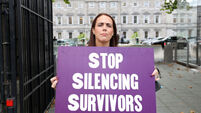Jennifer Horgan: Bereaved families want to discuss domestic homicide — we owe it to them to talk about it

The coffins of murder victims Vanessa Whyte and her children Sara and James Rutledge are carried from St Mary's Church in Maguiresbridge, Co Fermanagh, following a service of removal on Wednesday. Picture: Liam McBurney/PA
We don’t know what happened in Fermanagh — not exactly. We know only the basic facts: Another woman, Vanessa Whyte, and her two children, James and Sara Rutledge, have been killed in their home on this island.
The suspected killer, their husband and father Ian Rutledge, died days later — all four dying from gunshot wounds.















